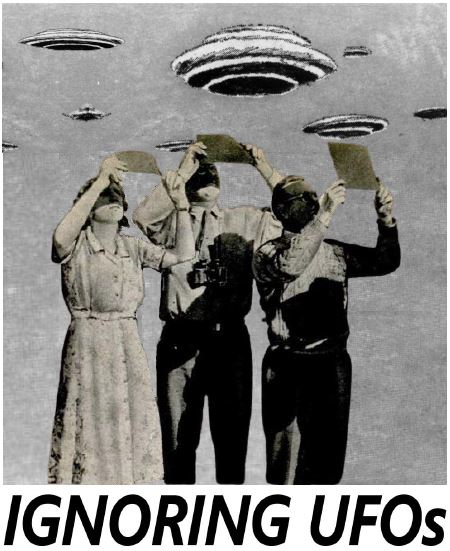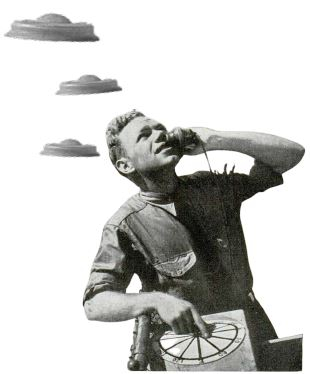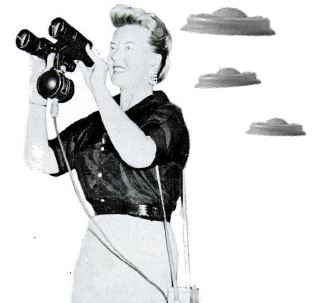The unconventional nature of UFOs challenges longstanding, human-centric ideas about freedom and self-governance. Authorities have avoided engaging in substantial UFO research as a result.
When asked for his opinion about flying saucers, Albert Einstein admitted that witnesses “have seen something,” but was uninterested in finding them any answers: “What it is I do not know and I am not curious to know.”
So much for the quest for knowledge.
It doesn’t take a PhD to realize that ‘the authorities’ lack a sense of urgency when it comes to studying UFOs, but it did take a couple of doctoral graduates to analyze the reasons why. Frustrated by the fact that unknown objects have been a fixture in our skies for decades, yet “human beings still have no idea what they are, and are not even trying to find out,” Drs. Wendt and Duvall sought to uncover the motives behind this willful ignorance (Sovereignty and the UFO, 2008).
They concluded that if authorities determined UFOs were the product of an intelligent race of non-humans, our anthropocentric worldview would be called into question, and along with it, our modern system of rule. Poking the saucer nest might even bring about humanity’s own demise, since extraterrestrials with the technology to reach our planet could be “sovereign deciders in their own right.” Because of this uncertainty, authorities avoid engaging in meaningful UFO inquiry.
The State’s survival-instinct influences its institutions and cultivates a culture of academic apathy when it comes to UFOs. This “authoritative taboo on taking UFOs seriously” is baffling when there are plenty of reasons to be curious. The authors estimate that “25-30 percent” of reported cases can’t be explained through conventional means. These may be mundane occurrences, or “humanly unknowable” phenomena, but the point is that humans wouldn’t know either way, because UFOs haven’t undergone rigorous and honest scrutiny.
The level of official disinterest is unusual since part of the State’s function is to partner with Science to make things knowable to its citizens: “Through science, the state makes its subjects and objects known.” Since Science can’t explain UFOs—or rule out a possible ET origin—their presence undermines the State’s potency and distorts our sense of sovereignty.
Anomalous aerial objects appear unannounced, defy accepted laws of physics, and are impossible to recreate—actions that place it outside an Earthly authority’s sphere of control. Their high degree of unknowability contributes to a formal policy of indifference, despite the fact that “it is not known, scientifically, that UFOs are not ETs.” Part of this paradoxical problem lies in the fact that the only groups with the resources to tackle such an endeavor are those in positions of power—“precisely those actors most resistant to taking UFOs seriously.”
State-sponsored “UFO denial” manifests in subtle ways. There are no public encouragements to investigate UFOs, and as a result, most studies that take place outside of the ‘mainstream’ are seen as a threat to “the foundations of scientific authority.” The doctrine of dismissal is so well ingrained that many professionals consider it gratuitous to examine unidentified flying objects, even as they search for a clear definition of the phenomenon.
The mindset goes like this: “Members of the general public might believe that UFOs are ETs, but authoritatively We know they are not.” The State is satisfied with framing UFOs in terms of “believers” vs. “unbelievers” instead of knowers. And since “unbelievers have secured the authority of science ... their views are taken as fact.”
This mentality was immortalized in a memo written by Robert Low, coordinator for the 1966 government-backed UFO research project known as the Condon Committee:
“The trick would be, I think, to describe the project so that, to the public, it would appear a totally objective study but, to the scientific community, would present the image of a group of nonbelievers trying their best to be objective but having an almost zero expectation of finding a saucer.”
Low’s words exemplify the prevailing attitude that favors predetermined results and an unwillingness to confront the UFO taboo.
Politicians take their cues from this scientific orthodoxy and assume the same skeptical attitude: “If UFOs cannot be known scientifically then why bother study [sic] them?” The cycle becomes self-fulfilling. Instead of enticing scientists, this profound mystery has become off-limits. The main commandment from the State has become: “Thou shalt not try very hard to find out what UFOs are.” These themes are worthwhile to consider in light of Congress and NASA expanding their UFO research initiatives.
If some lawmakers in Congress sound like they’re going off script—breaking the UFO taboo by suggesting the possibility of ET craft buzzing Earth—perhaps they’re reading a few pages ahead. The amount of defense funding that might be available to help protect against an alien invasion is probably enough to have any politician hinting at the potential of other-worldly adversaries.
While the world waits patiently for the next public UFO report, if the authors of Sovereignty and the UFO are correct, there will be few revelations or insights about potential extraterrestrial visitors. They argue that the authorities have gotten good at making it look like they’re actually doing something when they aren’t—employing “techniques for making UFOs known without actually trying to find out what they are.” Just imagine how much taxpayer money could be spent to keep alive a project that isn’t trying to seriously find an answer. (Come to think of it, that sounds like a majority of Federal programs.)
Professional resistance to the UFO taboo is an uphill battle, and Drs. Wendt and Duvall warn that “those who attempt it will have difficulty funding and publishing their work, and their reputations will suffer.” This isn’t because they’re wasting time tilting at windmills, it’s because breaking the taboo “is resistance to modern sovereignty itself”—a self-destructive path that modern rulers can’t endorse. In the spirit of preservation, the State refrains from being curious: “We are not saying the authorities are hiding The Truth about UFOs, much less that it is ET. We are saying they cannot ask the question.”
This leads to a contradiction that has authorities demanding to see proof of UFOs before agreeing to investigate them.
Still, the-powers-that-be might be onto something. How would humans react if the rules governing their society were suddenly upended by the revelation of an advanced off-world entity? Would they still pledge fealty to a terrestrial authority who was suddenly unsure about their place on the cosmic food chain?
While President Ronald Reagan is credited with saying that nothing would unite people and governments across the globe like the threat of an ET invasion, based on the authors’ conclusions, he was wrong. If ETs arrived on Earth, humanity’s sense of supremacy would erode, and with it, any semblance of modern rule. “The UFO calls into question the state’s claim to protect its citizens, which it would be unwilling to admit. Because the threat is so grave, the only rational response is to ignore the UFO.”
More than just a physical threat, ETs with better technology and higher intelligence constitute an existential risk to human independence.
Perhaps official efforts like the Unidentified Aerospace-Undersea Phenomena Joint Program Office (UAPJPO) and scientist-packed Galileo Project are signs that the UFO taboo is faltering. But it remains to be seen whether our desire to retain human-centered notions about sovereignty and liberty will override earnest attempts to arrive at the truth, or if the legacy of ignorance will prevail.
Radar traces, witness testimonies, and video evidence prove the reality of UFOs, even if they aren’t extraterrestrial. The absence of rigorous investigation by the State “should surprise and disturb us all, and cast doubt on the structure of rule that requires and sustains it.” Strange things in the sky evade a concrete definition, which is exactly why they frighten authorities and threaten the tenets of human sovereignty.
Even if we’re scared of the answer to the UFO question, we shouldn’t be afraid to ask.
 https://substackcdn.com/image/fetch/w_848,c_limit,f_auto,q_auto:good,fl_progressive:steep/https%3A%2F%2Fbucketeer-e05bbc84-baa3-437e-9518-adb32be77984.s3.amazonaws.com%2Fpublic%2Fimages%2F65e18145-da86-4e43-9945-88ed010adb4d_260x24.png 848w, https://substackcdn.com/image/fetch/w_1272,c_limit,f_auto,q_auto:good,fl_progressive:steep/https%3A%2F%2Fbucketeer-e05bbc84-baa3-437e-9518-adb32be77984.s3.amazonaws.com%2Fpublic%2Fimages%2F65e18145-da86-4e43-9945-88ed010adb4d_260x24.png 1272w, https://substackcdn.com/image/fetch/w_1456,c_limit,f_auto,q_auto:good,fl_progressive:steep/https%3A%2F%2Fbucketeer-e05bbc84-baa3-437e-9518-adb32be77984.s3.amazonaws.com%2Fpublic%2Fimages%2F65e18145-da86-4e43-9945-88ed010adb4d_260x24.png 1456w" alt="" width="260" height="24" data-attrs="{"src":"https://bucketeer-e05bbc84-baa3-437e-9518-adb32be77984.s3.amazonaws.com/public/images/65e18145-da86-4e43-9945-88ed010adb4d_260x24.png","fullscreen":null,"imageSize":null,"height":24,"width":260,"resizeWidth":null,"bytes":2275,"alt":"","title":"","type":"image/png","href":null,"belowTheFold":true,"internalRedirect":null}" />
https://substackcdn.com/image/fetch/w_848,c_limit,f_auto,q_auto:good,fl_progressive:steep/https%3A%2F%2Fbucketeer-e05bbc84-baa3-437e-9518-adb32be77984.s3.amazonaws.com%2Fpublic%2Fimages%2F65e18145-da86-4e43-9945-88ed010adb4d_260x24.png 848w, https://substackcdn.com/image/fetch/w_1272,c_limit,f_auto,q_auto:good,fl_progressive:steep/https%3A%2F%2Fbucketeer-e05bbc84-baa3-437e-9518-adb32be77984.s3.amazonaws.com%2Fpublic%2Fimages%2F65e18145-da86-4e43-9945-88ed010adb4d_260x24.png 1272w, https://substackcdn.com/image/fetch/w_1456,c_limit,f_auto,q_auto:good,fl_progressive:steep/https%3A%2F%2Fbucketeer-e05bbc84-baa3-437e-9518-adb32be77984.s3.amazonaws.com%2Fpublic%2Fimages%2F65e18145-da86-4e43-9945-88ed010adb4d_260x24.png 1456w" alt="" width="260" height="24" data-attrs="{"src":"https://bucketeer-e05bbc84-baa3-437e-9518-adb32be77984.s3.amazonaws.com/public/images/65e18145-da86-4e43-9945-88ed010adb4d_260x24.png","fullscreen":null,"imageSize":null,"height":24,"width":260,"resizeWidth":null,"bytes":2275,"alt":"","title":"","type":"image/png","href":null,"belowTheFold":true,"internalRedirect":null}" />https://theobservermagazine.substack.com/p/ignoring-ufos
You need to be a member of Ashtar Command - Spiritual Community to add comments!


 nothing to see here...
nothing to see here... Look! Over There!
Look! Over There!



Replies